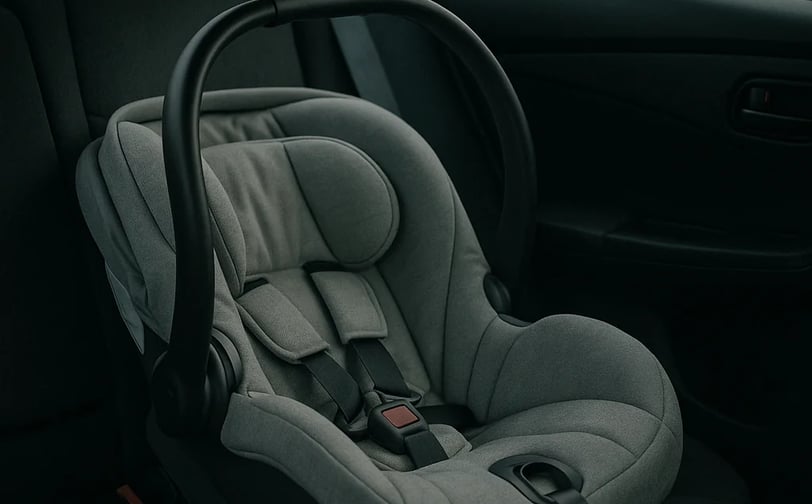Leaving the Hospital with an Empty Car Seat
In 2011, we left the hospital with the same bags we arrived with — but no baby in the car seat we had so carefully prepared. This is the story of unimaginable loss, the strength of a mother in the face of heartbreak, and the silent drive home after our daughter was stillborn. A personal reflection on grief, love, and learning to carry the weight of a child you never got to raise.
AWithYou
4/13/20253 min read


Nine months of planning. Decorating the nursery. Choosing names. Washing baby clothes that smelled of fabric softener and hope. Packing the hospital bags. Fitting the child seat into the back of the car. It’s what so many expectant parents do — full of nerves, excitement, and love.
That’s how our journey started too.
The day had finally come. My wife was experiencing the discomfort of labour — that mixture of pain and purpose, where every twinge meant we were closer to meeting our baby. There was nervous energy in the car, but underneath it was a deep excitement. After all this time, we were finally on our way to become parents.
We had done everything by the book. Regular check-ups. Hospital bag in the hallway. The child seat installed, checked, and double-checked in the rear of the car. I remember turning around at traffic lights just to glance at it — a visual reminder of the new life we were about to start.
But that night, everything changed.
It was sometime in the middle of the night when the scan happened. We’d been admitted, and things seemed normal — until they weren’t. I noticed a shift in the nurse’s expression as she ran the scanner across my wife’s belly. Her face changed. Not panic, exactly — just a controlled kind of concern. She said she needed to call the on-call doctor.
He arrived quickly. Professional. Calm. He repeated the scan himself, and there was silence for a few moments that felt like hours. Then, gently, he said the words I still hear sometimes in my sleep:
“I’m really sorry… there’s no heartbeat.”
I don’t remember what I said — if I said anything at all. But I do remember the scream from my wife. It was raw. The sound of something breaking that can never be put back together. That scream will haunt me forever.
And then — as if the cruelty of those words wasn’t enough — she had to go through labour. She still had to give birth. Except now, we knew what the outcome would be.
There are no words for what that kind of strength looks like. I sat beside her, holding her hand, powerless. She did something extraordinary in the most devastating of circumstances. Our daughter was born silently into a room full of tears.
We spent the night with her.
She was beautiful. Tiny hands. Soft cheeks. A little button nose. She looked like she might stir at any moment — but she wouldn’t. She was already gone.
The hospital was kind. They gave us time. They gave us space. We held her. We cried. We tried to memorise every part of her before we had to say goodbye.
And then, like every other new parent, we were discharged.
We walked out of that hospital with the same bags we had packed weeks earlier. The same car seat still fitted in the back of the car. But there was no baby.
The silence in that car was deafening.
We had left the house as two people expecting to return as three. Nine months of planning. Nine months of dreaming. And now, we were just two broken people in a car, carrying empty bags and a lifetime of grief.
I remember unlocking the front door and stepping inside. The house hadn’t changed — but we had. We moved slowly, as if everything might fall apart if we made a sudden sound.
Her room was ready. We had painted it together. Assembled the cot. Nappies were stacked. Clothes folded. It was a room full of life. But it felt like a museum — untouched and echoing with what should have been.
There’s no handbook for what to do next. No one tells you how to grieve a future you never got to live. We were parents, but without a baby. We had love with nowhere to go.
That first night at home was unbearable. The silence heavier. We tried to sleep but couldn’t. We tried to eat but didn’t. Grief filled every room.
This isn’t the end of the story. But this was the moment everything changed. We were two people who had lost something so precious, so irreplaceable, that the world felt different — quieter, harder, and deeply unfair.
I write this now, years later, not because the pain is gone — it isn’t — but because silence never helped me. Talking, writing, remembering… that’s what brought some light into the darkest place I’ve ever been.
If you’ve ever left a hospital with an empty car seat, I want you to know: you are not alone. I see you. I remember what it’s like to carry that weight. And I’m still carrying it — just a little more gently now.
